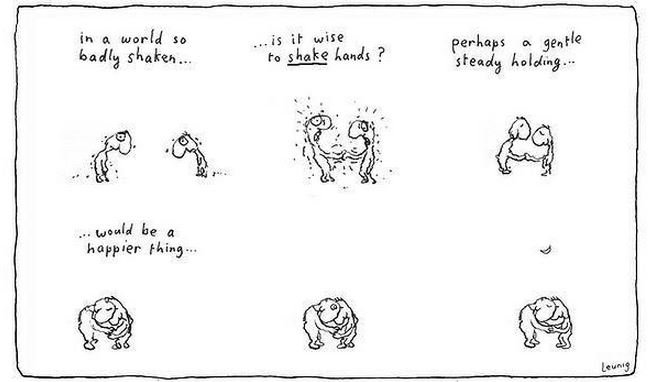Of course Covid 19 has changed the way we greet each other. Social distancing has meant the routine handshake is no longer an acceptable form of greeting. Nowadays you are as likely to be offered a shoulder, or a foot. It might be best to simply raise your hand in a friendly acknowledgement.
Learn about greetings (requires Real Player).
Everyday Greetings
 |
|||
 |
|||
 |
|||
 |
|
||
 |
+ |
 |
|
 |
+ |
 |
"Good night." |
Special Greetings
 |
|
| 00.01 - 1st January | |
 |
|
 or or  etc.... etc.... |
|
 or or etc... etc... |
|
 |
Shaking Hands
 |
When meeting someone formally for the first time, we used to shake their hand and say "How do you do?" or "Pleased to meet you." "How do you do?" isn't really a question, it just means "Hello". |
 |
When young people meet informally they sometimes say "Give me five!" and slap their hands together (high five). Covid has changed this greeting to an elbow bump, or a foot nudge. |
| Generally we do not shake hands with people we know well. | |
Cartoon by Michael Leunig © Republished with permission.
|
|
Naturally speaking
You say hello, and I say goodbye!
Follow the dialogue.
Mr Bean meets Mrs Breuer, one of his students, and her husband in the street.
| Mr Bean: | Good morning, Mrs Breuer. |
| Mrs Breuer: | Good morning, Mr Bean. How are you? |
| Mr Bean: | I'm fine thanks, and you? |
| Mrs Breuer: | Not too bad. Mr Bean, this is my husband Michael, Michael this is Mr Bean my English teacher. |
| Mr Breuer: | Pleased to meet you. |
| Mr Bean: | Pleased to meet you too. Are you from Germany, Mr Breuer? |
| Mr Breuer: | Yes, East Germany, from Dresden. And you, are you from London? |
| Mr Bean: | No, I'm from Derby, but I live in London now. |
| Mrs Breuer: | Well, goodbye Mr Bean, it was nice to see you. |
| Mr Bean: | Yes, goodbye. |
Formal to Informal Greetings and Introductions
First meetings
Formal |
Introducing yourself |
Introducing others |
Responding to an introduction |
On Leaving |
|
|
|
|
|
||
|
|
|
|
||
|
|
|
|
||
Informal |
|||||
Subsequent meetings
Formal |
Possible Greetings |
Possible responses |
|
|
|
||
|
|
||
|
|
||
|
|
||
|
|
||
|
|
||
Informal |
|||
!Note - on first meeting say, "It's nice to meet you", and when departing "It was nice to meet you", or "Nice to have met you."
For future meetings say, "It's nice to see you again", and when departing, "It was nice to see you again."
More information on greetings here.


